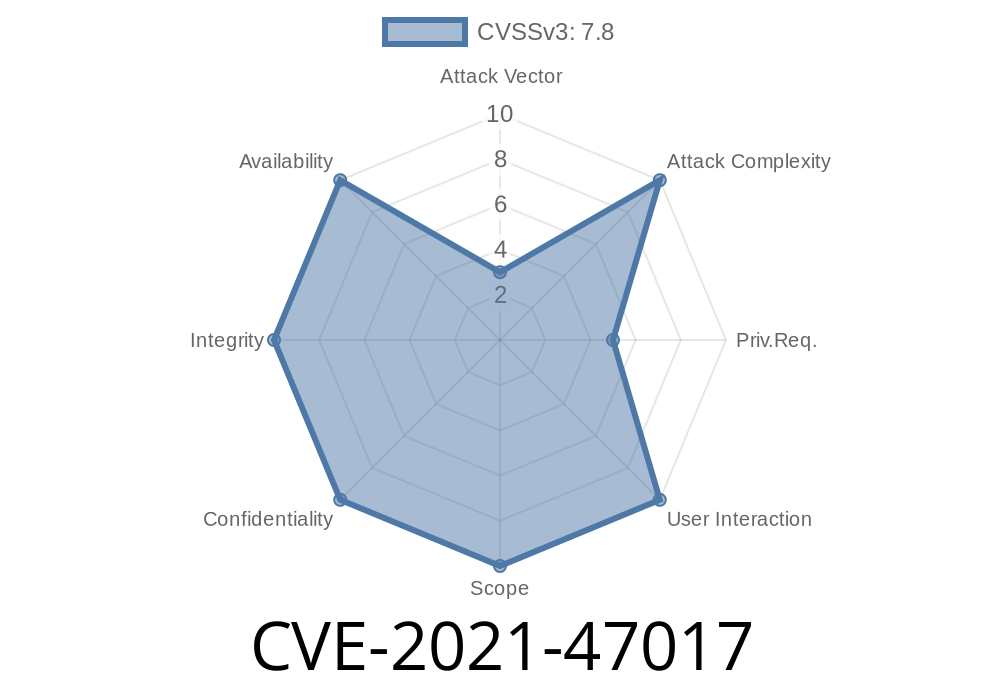In 2021, a critical use-after-free bug was discovered and fixed in the Linux kernel's ath10k Wi-Fi driver. Identified as CVE-2021-47017, this flaw affected how network packet bundles were handled within the ath10k_htc_send_bundle function. Properly understanding, detecting, and patching such flaws is crucial for keeping Linux-based systems secure, especially given the wide use of ath10k chipsets in consumer and enterprise Wi-Fi hardware.
This article unpacks how the bug happened, explores the code, outlines how attackers might exploit the flaw, and explains the fix introduced by kernel maintainers.
What is ath10k and Why Should You Care?
ath10k is a widely-used Linux kernel driver made for Qualcomm’s Atheros 802.11ac wireless chipsets. Many Wi-Fi cards in laptops, desktops, routers, and IoT devices use this driver. Vulnerabilities in ath10k can lead to severe consequences—from crashing your system to letting attackers run malicious code on your device.
The Problem: Use-After-Free
Use-after-free means a program continues using memory after it’s been freed—like reading old mail that’s already been tossed out. Here, the problem was with the bundle_skb pointer inside the ath10k_htc_send_bundle function. The memory for bundle_skb was freed, but the code still used a value (bundle_skb->len) from that memory.
If an attacker managed to influence the memory freed and then reallocated, they could manipulate program execution, possibly causing a crash or worse, running malicious code.
Vulnerable Code Snippet
Before the patch
Here’s a simplified look at what went wrong
// bundle_skb is freed, but its length is still used afterwards!
dev_kfree_skb_any(bundle_skb);
// Oops! Use-after-free
skb_len = bundle_skb->len;
After freeing, bundle_skb could point to random memory data or become invalid. Accessing bundle_skb->len after the free is inherently dangerous.
The Patch: Fixing the Use-After-Free
The fix was straightforward and based on a fundamental programming principle: *Don’t touch freed memory!* The solution? Save the value you need before freeing.
After the patch
// Save length BEFORE freeing
skb_len = bundle_skb->len;
// Now it’s safe to free
dev_kfree_skb_any(bundle_skb);
// Use skb_len safely here
Reference
- Upstream kernel patch
- Original bug report
While triggering this bug would require specific conditions, here’s a simplified attack scenario
1. Trigger Free: An attacker floods the Wi-Fi driver with crafted packets, leading the kernel to free a bundle_skb.
2. Heap Spraying: Immediately after freeing, the attacker sends more data to the Wi-Fi card, hoping new data will occupy the just-freed memory (a common heap exploitation trick).
3. Hijack Control: If the attacker controls what’s in place of the old bundle_skb, when the driver accesses bundle_skb->len, it might use an attacker-controlled value, potentially leading to a crash (DoS) or even escalation to code execution.
Note: No public, reliable proof-of-concept exploit was published for this bug at the time of writing, but the risk with this type of bug is real.
Update Your Kernel!
This bug is patched in Linux kernel versions after the fix’s release. Use your distro’s update tool or compile your own kernel from the official source.
Monitor Security Advisories
For ath10k and other Linux driver security issues, keep an eye on your distro’s security bulletins or Linux kernel CVE feed.
Conclusion
CVE-2021-47017 reminds us how even small coding mistakes in device drivers can have wide security effects. Thanks to responsible disclosure and prompt patching, most Linux users are now protected — but only if they keep systems up to date. If you’re running Wi-Fi hardware under Linux, especially with Qualcomm/Atheros chipsets, double-check you’re not running a vulnerable kernel version.
Further Reading
- Linux Kernel Releases
- ath10k driver docs
Timeline
Published on: 02/28/2024 09:15:38 UTC
Last modified on: 12/09/2024 17:59:26 UTC
